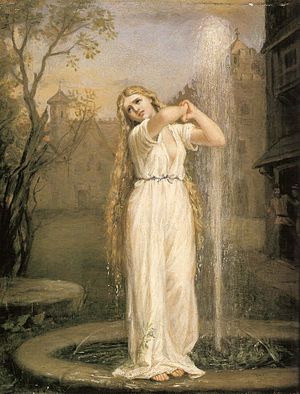Ondine's curse
| Central hypoventilation syndrome | |
|---|---|
| Synonyms | primary alveolar hypoventilation, alveolar hypoventilation secondary to neurologic disease, idiopathic acquired central hypoventilation syndrome |
 |
|
| Ondine by John William Waterhouse (1849–1917) | |
| Classification and external resources | |
| Specialty | Neurology |
| ICD-10 | G47.3 |
| ICD-9-CM | 348.8 |
| OMIM | 209880 |
| DiseasesDB | 32976 |
| MedlinePlus | 000078 |
| eMedicine | article/1002927 |
| MeSH | D020182 |
| GeneReviews | |
Central hypoventilation syndrome (CHS) is a respiratory disorder that results in respiratory arrest during sleep. CHS can either be congenital (CCHS) or acquired (ACHS) later in life. It is fatal if untreated. It is also known as Ondine's curse.
ACHS can develop as a result of severe injury or trauma to the brain or brainstem. Congenital cases are very rare and involves a failure of autonomic control of breathing. In 2006, there were only about 200 known cases worldwide. As of 2008, only 1000 total cases were known. The diagnosis may be delayed because of variations in the severity of the manifestations or lack of awareness in the medical community, particularly in milder cases. However, as there have been cases where asymptomatic family members also were found to have CCHS, it may be that these figures only reflect those found to require mechanical ventilation. In all cases, episodes of apnea occur in sleep, but in a few patients, at the most severe end of the spectrum, apnea also occurs while awake.
Although rare, cases of long-term untreated CCHS have been reported and are termed late onset CCHS (LO-CCHS). Cases that go undiagnosed until later life and middle age, although the symptoms are usually obvious in retrospect. There have, however, even been cases of LO-CCHS where family members found to have it have been asymptomatic. Again, lack of awareness in the medical community may cause such a delay. CCHS susceptibility is not known to be affected by gender.
CHS is associated with respiratory arrests during sleep and, in some cases, to neuroblastoma (tumors of the sympathetic ganglia), Hirschsprung disease (partial agenesis of the enteric nervous system),dysphagia (difficulty swallowing) and anomalies of the pupilla. Other symptoms include darkening of skin color from inadequate amounts of oxygen, drowsiness, fatigue, headaches, and an inability to sleep at night. Those suffering from Ondine's curse also have a sensitivity to sedatives and narcotics, which makes respiration even more difficult. A low concentration of oxygen in the red blood cells also may cause hypoxia-induced pulmonary vasoconstriction and pulmonary hypertension, culminating in cor pulmonale or a failure of the right side of the heart. Associated complications may also include gastro-esophageal reflux, ophthalmologic issues, seizures, recurrent pneumonia, developmental delays, learning disabilities and episodes of fainting and temperature disregulation
...
Wikipedia
